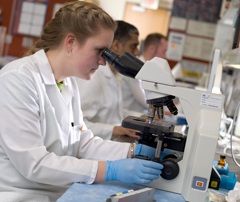Career Opportunities
 The
VMD-PhD program has been in existence since the late 1960s. Over 85% of our graduates hold positions in scientific
research at academic institutions, research institutes, government agencies, or the pharmaceutical industry. Our
alumni show a high level of achievement, a steady positive progression in seniority of faculty or pharmaceutical
positions, and command a strong funding base. VMD-PhD (DVM-PhD) graduates are highly trained and are qualified to
enter into numerous career pathways.
The
VMD-PhD program has been in existence since the late 1960s. Over 85% of our graduates hold positions in scientific
research at academic institutions, research institutes, government agencies, or the pharmaceutical industry. Our
alumni show a high level of achievement, a steady positive progression in seniority of faculty or pharmaceutical
positions, and command a strong funding base. VMD-PhD (DVM-PhD) graduates are highly trained and are qualified to
enter into numerous career pathways.
-
Academic Faculty
- Veterinary scientists work at Universities, Colleges, Medical Schools, and Veterinary Schools. Fifty-five
percent of Penn VMD-PhD graduates are in academic careers with more than half holding academic titled positions.
-
Biotechnology or the Pharmaceutical Industry
- Veterinary scientists are extremely successful in industry careers with more than half of Penn VMD-PhD
graduates who
enter these careers serving as either presidents or directors of their companies.
-
Government Health and Science Agencies
- Because of their broad training, veterinary scientists are well suited to careers at Government
Health and
Science Agencies such as the National Institutes of Health and National Science Foundation. In
addition to
research, these veterinary scientists set public health policy.
-
Public Health and Emerging Diseases
- The fields of public health and emerging diseases require individuals who understand how
diseases spread
between species as well as within populations of the same species. Veterinary scientists are
perfectly
suited for these exciting careers. In addition, wildlife conservation and reproductive health of
species are
areas of excellence for veterinary scientists. Veterinary scientists work for the Centers for
Disease
Control, World Health Organization, and Federal and State Public Health Agencies.
-
Regulatory Medicine
- Veterinary scientists work for United States Department of Agriculture, and the Food and Drug
Administration
to monitor food and drug safety. Veterinarians supervise shipments of animals, test for
diseases, and design
programs to control diseases such as tuberculosis, brucellosis, and rabies.
-
Clinical Research and Clinical Practice
- Some veterinary scientists continue using their clinical skills by working predominately at
schools or veterinary medicine.